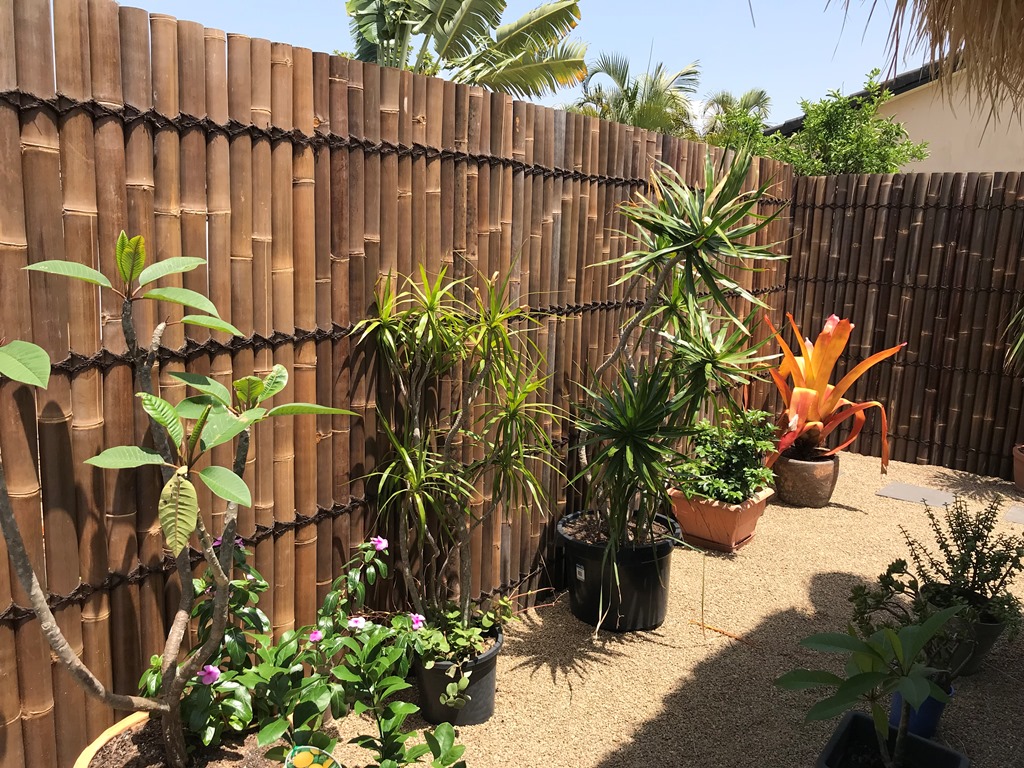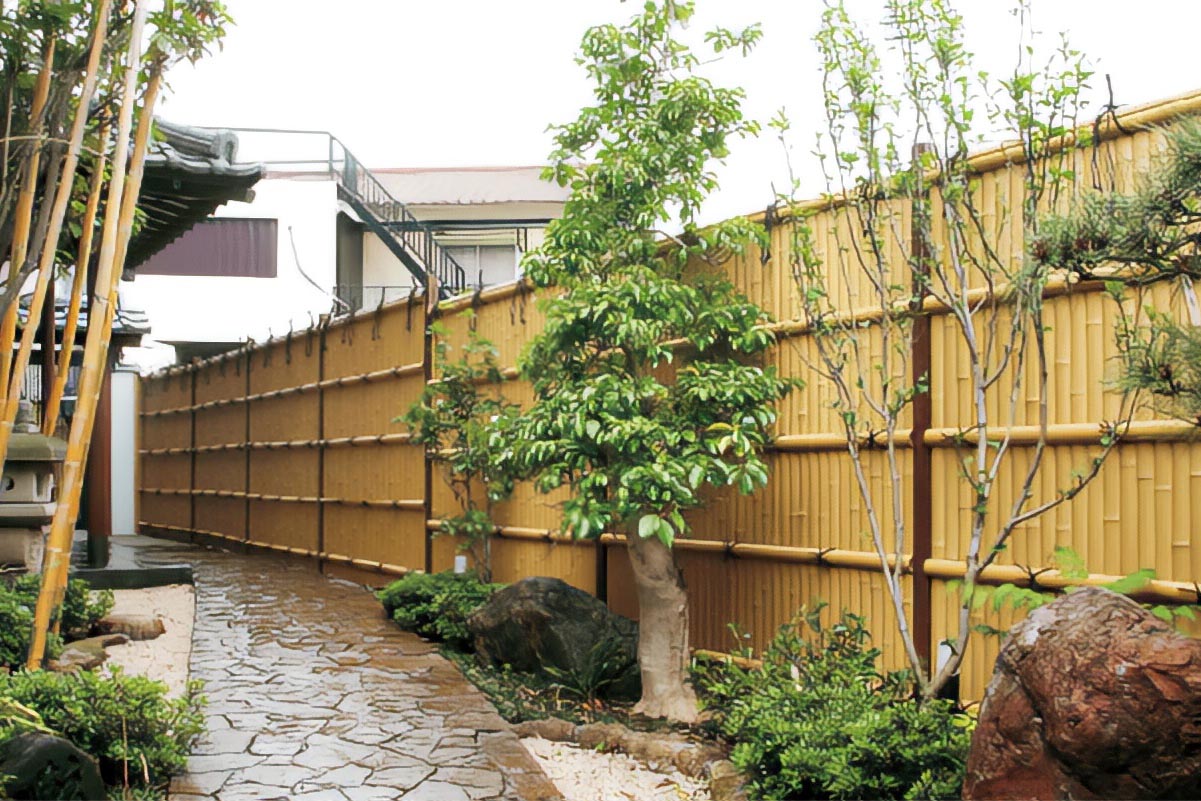
In recent years, fences and gates made from natural materials such as wood, bamboo, etc., have become increasingly popular. One of the main reasons is their natural, rustic, and simple beauty compared to other traditional materials like steel, aluminum, wrought iron.
Bamboo is a unique and attractive material that can be used to craft fences or gates according to users’ preferences, suitable for homeowners who appreciate the natural ambiance and aroma of bamboo. Bamboo fences have gained popularity in the current market due to the balance they offer between privacy and the appealing beauty of nature. To understand more about the characteristics, advantages, and disadvantages of bamboo fences, let’s dive into this blog.
What are Bamboo Fences?

Bamboo fences are fencing structures crafted primarily from bamboo, a versatile and sustainable material derived from certain species of bamboo plants. These fences are constructed by arranging bamboo poles or slats together in various patterns, such as vertically, horizontally, or diagonally, and securing them with wire, string, or other fasteners.
Bamboo fences are prized for their natural aesthetic appeal, eco-friendliness, and durability. They offer a unique blend of functionality and beauty, providing privacy, security, and a touch of natural elegance to outdoor spaces. Bamboo fencing are popular choices for homeowners seeking environmentally friendly and visually pleasing alternatives to traditional fencing materials.
Advantages of Bamboo Fences
Natural and Elegant Aesthetic
The natural aesthetic of bamboo fences is unparalleled, offering a unique blend of beauty, functionality, and sustainability. Bamboo, with its slender stalks, graceful growth patterns, and subtle variations in color, brings an inherent elegance and tranquility to outdoor spaces. One of the most striking features of bamboo fencing is their organic texture, which adds depth and visual interest to any landscape. Unlike traditional fencing materials, such as wood or metal, bamboo has a distinctively natural and earthy appeal that harmonizes effortlessly with its surroundings.
These fences are available in a variety of styles, from tightly woven panels to open lattice designs, allowing homeowners to customize the look and feel of their outdoor areas. The slender profile of bamboo stalks allows for ample airflow and light penetration, making them ideal for creating shaded retreats or delineating garden spaces without blocking views.
Eco-friendly
Bamboo fences are celebrated for their eco-friendly attributes, embodying sustainability, renewability, and environmental responsibility. As one of the fastest-growing plants on the planet, bamboo is renowned for its rapid growth rate and prolific regeneration, making it an exceptionally renewable resource. Unlike traditional wood fencing materials, which can take decades to mature, bamboo can reach maturity in just a few years, making it an ideal choice for environmentally conscious homeowners seeking sustainable alternatives.
The cultivation of bamboo requires minimal water, pesticides, and fertilizers compared to other crops, making it a low-impact and resource-efficient material. Bamboo forests help mitigate climate change by reducing greenhouse gas emissions and enhancing air quality. Another eco-friendly aspect of bamboo fences is their biodegradability at the end of their lifespan. Unlike plastic or metal fencing materials, which can persist in landfills for centuries, bamboo fences decompose naturally, returning nutrients to the soil and minimizing waste accumulation.
Easy Installation
Bamboo fences are prized for their ease of installation, offering homeowners a convenient and straightforward way to enhance their outdoor spaces with natural beauty and privacy. One of the key advantages of bamboo fencing is its lightweight and flexible nature, which simplifies the installation process and reduces the need for specialized tools or equipment.
To install this fences, homeowners typically begin by preparing the desired area and ensuring a level and stable foundation for the fence. This may involve clearing vegetation, leveling the ground, and installing posts or support structures as needed. Bamboo fencing panels are then secured to the posts or framework using screws, zip ties, or wire, depending on the specific design and installation method.
Disadvantage of Bamboo Fences

Limited Lifespan
Another disadvantage of bamboo fencing is its limited lifespan compared to other fencing materials. While bamboo is renewable and sustainable, it typically has a shorter lifespan than synthetic or metal fencing options, which may require homeowners to replace bamboo fences more frequently, resulting in higher long-term maintenance costs.
Therefore, while bamboo fences offer a natural and eco-friendly fencing option, homeowners should be aware of their limited lifespan and plan for periodic maintenance and potential replacements accordingly.
Prone to Rot and Mold
Due to its organic nature, bamboo is prone to rot, mold, and insect infestations over time if not properly treated and maintained. Without adequate protection and maintenance, bamboo fences may deteriorate more quickly than fences made from synthetic or metal materials, requiring more frequent repairs or replacements to ensure their longevity.
Bamboo fencing is also highly susceptible to weathering, especially when exposed to harsh environmental conditions such as intense sunlight, heavy rain, or high humidity. As a result, Bamboo fencing may require more frequent maintenance and upkeep to preserve their appearance and structural integrity. This may include regular cleaning, sealing, staining, or applying protective coatings to prevent weathering, fading, or damage from UV rays.
Cost
The cost of bamboo fencing can vary depending on factors such as quality, thickness, height, and design. Additionally, the installation process may also add to the overall cost, especially if professional installation is required. The cost of bamboo fencing tends to be slightly higher compared to other traditional materials such as aluminum and steel.
While bamboo fences offer unique aesthetic appeal and eco-friendly benefits, homeowners should consider their budget and weigh the cost of bamboo fencing against alternative options before making a decision.
Conclusion
Bamboo has become a trending material in recent years due to its novelty and natural, simplistic beauty. In addition to enhancing privacy and security, homeowners also install bamboo fences to enhance the aesthetic appeal of their homes.
Clearly, a bamboo fence will attract and appeal to others due to its elegant yet stylish beauty. However, if you intend to install these fences, you need to understand some of the drawbacks they bring, such as low durability, high cost,





